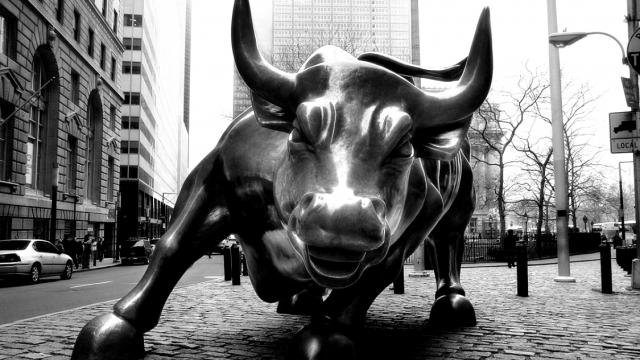
There probably aren’t many industries more hostile to government than financial services. That’s the polite term for an industry, once called “banking,” that grew from a boring 3 percent of the economy in 1960 to 8 percent on the eve of the 2008 financial crisis, along the way acquiring the specious glamour of the casino business.
This transformation was due in no small part to the viscerally anti-government Walter Wriston, who as CEO of Citibank (then First National City Bank) badgered the Nixon administration into the first of a long string of deregulatory measures that led in more or less a straight line to the financial crisis of 2008 and to an ideologically inconvenient thing called TARP (for Troubled Asset Relief Program).
It’s hard to exaggerate the irony and hypocrisy that underlay TARP, one of many government handouts that beginning in 2008 rescued overpaid and under-scrupled mega bankers from the consequences of their own malfeasance. The exalted people in Wall Street’s C-level suites say they believe in letting private markets render harsh verdicts – until, of course, they find themselves in the dock. That’s when government handouts cease being giveaway socialism and suddenly become What’s In The National Interest.
There is some truth to this nonetheless self-serving argument. Letting mega banks fail would set off a cascade of defaults and business failures that would devastate the real economy (as opposed to the rarified part where bankers trade paper), as happened in the 1930s and in 2008-09. So a mammoth bailout was probably justified under the circumstances, even if there was no justification for the circumstances.
The cost of the past decade’s bankster welfare is hard to put a number on, but the non-profit group Better Markets has taken a stab at it in a newly published paper, “Wall Street’s Six Biggest Bailed-Out Banks: Their RAP Sheets & Their Ongoing Crime Spree.” Its top-line figure: $29 trillion in total bailout money. Some $8.2 trillion of that went to the six largest banks (TARP represented only 8.5 percent of that).
In return, for various infractions the six (Bank of America, Goldman Sachs, Citigroup, Wells Fargo, Morgan Stanley, JPMorgan Chase) paid collective fines and settlements of $182 billion. That equals 2.2 percent of their bailout money, which itself was only are part of the total aid, some of it literally incalculable. For starters, you can’t put a number on the collateral damage that was avoided because taxpayers provided a safety net.
More specifically, as Better Markets notes, when the Federal Reserve allowed Goldman Sachs and Morgan Stanley to transform themselves overnight from investment banks into bank holding companies, they became eligible for the full menu of rescue programs. The value of this concession “was unquantifiable but priceless,” the report notes. “There is no doubt that, but for this action, both banks would have gone bankrupt…”
The fines, then, were a perverse sort of “loss leader,” MBA-speak for costs incurred to generate business, like when you give away toasters to win new customers.
If there was a paramount lesson to be found in the rubble of 2008, it was that Wall Street’s anti-government, pro-market “principle” is really just weaponized rhetoric to be deployed when beating back profit-threatening regulation, then tossed out the window the minute profits require government.
In fact, this should have been obvious long before 2008. Take Citibank’s Mr. Wriston, whose feverish zeal for dismantling New Deal financial regulation became a “personal crusade,” according to Jeff Madrick’s excellent “Age of Greed,” a history of neo-liberal deregulations over the past 50 years. Yet when a major Citibank borrower, the Penn Central railroad, filed for record-setting bankruptcy in 1970, Mr. Wriston changed hues like a cuttlefish.
“Effortlessly shedding the mantle of Adam Smith for the role of senior corporate statesman, Wriston speciously argued for government money on the grounds of national security,” according to one account. “What he meant was Citi’s security.” So much for getting government out of the way. Citi’s rescue was the first of many that long preceded TARP.
Bailouts are one thing; criminality is another. The bankster rap sheet Better Markets documents lists infractions that followed the 2008 crisis, and they include “fraud, money laundering, and market manipulation to foreclosure abuses, unlawful debt collection practices, antitrust violations, conflicts of interest, and kickback schemes.”
Among the particulars: Citigroup’s participation in schemes to manipulate foreign-exchange rates and LIBOR (a globally important interest rate), for which together it paid $1.1 billion in fines and settlements; JPMorgan Chase’s involvement in the “London Whale” scandal and various unfair billing practices ($1.25 billion), and Wells Fargo’s identity and accounting fraud ($185 million in fines and lawsuits seeking billions.)
What marks these scams is the near absence of personal responsibility among the obscenely paid people who cooked them up. When mega banks pay fines to regulators, they do it with shareholders’ money. Robert Khazumi, at the time the Securities and Exchange Commission’s director of enforcement, told the Times in 2010 that targeting companies rather than individuals “sends a message within the company” and “to the industry.”
Yes, and the message is that mega-bank executives can commit white-collar crime with impunity, put the entire world financial system at risk, and still retire comfortably to an Upper West Side condo and a Shingle-style getaway in Montauk. A clearer message would be sharing a cell with Bernie Madoff, but that would require prosecutorial backbone that conveniently went missing after 2008.
The Walter Wristons of the world can’t afford to admit it, but they don’t enrich themselves despite the heavy hand of capricious government; they get rich because of government.
Chris Gay is a veteran of financial journalism who writes from New York.















